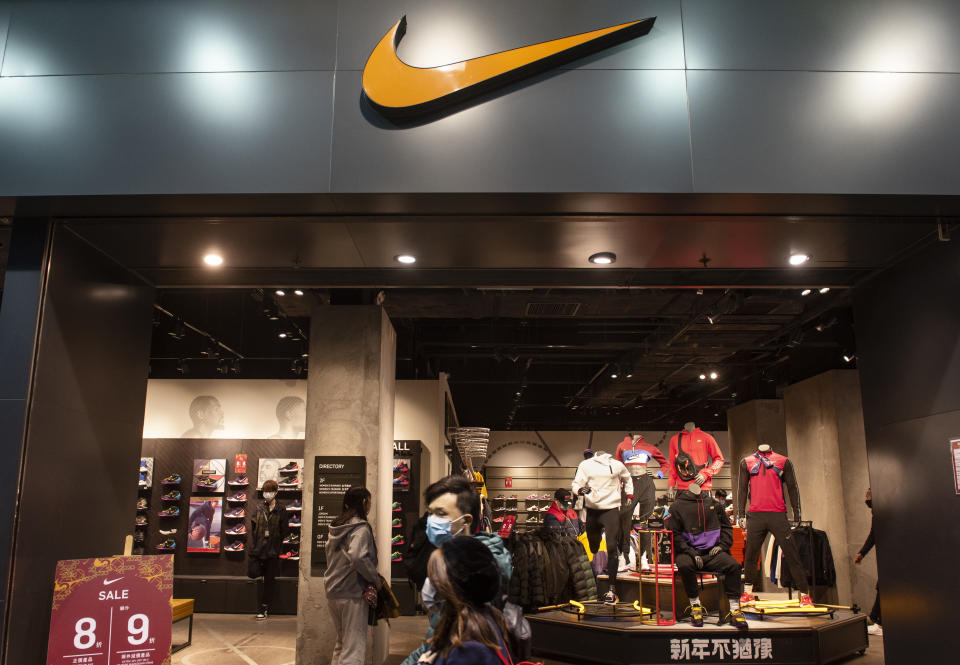Nike, Lululemon say they learned lessons from coronavirus store closures in China
Nike reported third-quarter earnings this week, and unsurprisingly, its sales in China dropped for the first time in more than 20 straight quarters, falling 4% because of store closures while China was getting hit by the coronavirus pandemic.
But there were silver linings: Nike’s (NKE) online sales in China spiked more than 30% in the quarter, suggesting that consumers stuck at home were still happy to make purchases online; Nike saw high engagement on its mobile apps (both its fitness and e-commerce apps) amid the peak of the outbreak in China; and Nike says it is already seeing signs of a rebound in store sales in China now that it has reopened 80% of its stores there.
Nike shares rose 24% this week, but are down 17% for the year.
“We’re seeing the other side of the crisis in China,” said new Nike CEO John Donahoe. “Due to the resilience and creativity of our team in China, we now have a playbook that we can use elsewhere. In addition to Greater China, we’ve applied that playbook in Japan and South Korea over the past two months, and we’re seeing early momentum in those markets as well... With COVID-19 now spreading across Europe and the U.S., we are applying the same playbook.”
The playbook appears to be: keep stores closed as long as local authorities and experts mandate in order to protect the health of customers and employees, but push e-commerce from distribution centers while stores are closed; once it’s safe to reopen stores, ramp back up quickly.

Lululemon sounded a very similar note.
The athleisure leader beat Wall Street expectations, driven by a continued surge in sales of its men’s clothing, the same segment that has been fueling Lululemon (LULU) for a few quarters now. Due to coronavirus, Lululemon is not providing 2020 full-year outlook.
Like Nike (and many other sports and apparel retailers like Under Armour, New Balance, Adidas, REI, and Urban Outfitters), Lululemon has closed all of its U.S. stores amid the spread of coronavirus. But in China, which is through the worst of coronavirus, Lululemon has now reopened all but one of its stores.
And Lululemon CEO Calvin McDonald said on Thursday’s earnings call that sales in China are growing quickly, though not yet back to pre-coronavirus levels. He concluded that the China business “will bounce back” and indicated that the same can be applied to the U.S. once the U.S. is through the worst of coronavirus, even though store closures will last longer in the U.S. than they did in China.
Lululemon shares are up 15% this week, but down 19% for the year.
Nike and Lululemon aren’t alone among major U.S. retail chains that closed all their stores in China. Apple last week reopened all 42 of its stores in China, and Starbucks began reopening all of its China stores at the end of February, citing “early signs of recovery” there.
All of these companies will surely watch brick-and-mortar sales trends in China and apply them—if optimistically—to what they hope to see happen once the U.S. is through the worst of the virus.
—
Daniel Roberts is an editor-at-large at Yahoo Finance. Follow him on Twitter at @readDanwrite.
Read more on how coronavirus is hitting a wide range of industries:
Amid coronavirus, Walmart says it's seeing increased sales of tops — but not bottoms
Chef Tom Colicchio on coronavirus: Restaurants should stay closed, even for takeout
Coronavirus puts 'extreme pressure' on all three pillars of Disney's business
Movie theaters seek bailout as coronavirus devastates business

